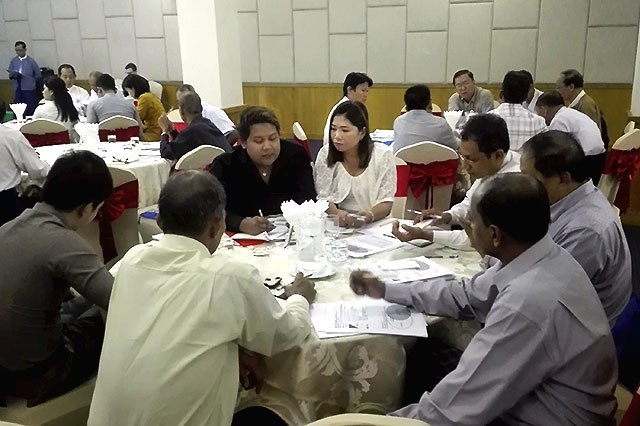SMEs in Mon and Kayin State Want Less Red Tape, Fewer Committees, and Clear Procedures and Fees

On 2 and 3 July, MCRB, together with the UN Development Programme (UNDP) as part of the FairBiz programme supported by the UK FCO Prosperity Fund, organised day long training and consultation workshops for local businesses via the local Chambers of Commerce in Mawlamyaing (Mon State) and Hpa-an (Kayin State). There were 20-30 participants at each session, mostly local SMEs from agriculture and fish farming, construction, trading, including petrol stations, wholesale, logistics, tourism, education and ICT services.
The aims of the workshops were to:
strengthen local business’ understanding of responsible business practices
identify their main challenges in applying such standards in practice and
explore tools and strategies for businesses to address these challenges.
Aung Kyaw Soe of MCRB explained the principles of responsible business. These include compliance with the law and respect for human rights; ‘going beyond’ through sustainability and creating shared value (CSV); and the distinction between these and philanthropy/donations. Participants played an interactive game in which they were invited to discuss in small groups whether 16 specific business scenarios consisted of a compliance requirement, CSV, philanthropy or possible corruption.
Phyu Phyu Zin of MCRB outlined the difference types of corruption, and highlighted current developments in Myanmar, including the work of the Anti-Corruption Commission and its Notification 14/2018 setting out principles for business to combat corruption. She also highlighted the President’s Office Code of Conduct for gifts to officials, and other toolkits and best practice examples, including those available in Burmese.
Participants were polled on their perceptions of corruption with the Mawlamyaing group most optimistic about improvements in recent years, and the Kayin group split between those who saw improvement and those who saw the problem getting worse.
They were asked to identify specific corruption risks that they encountered as businesses. Participants focussed primarily on the tendering, regulatory and permitting processes, including land permits, immigration, tax, border trade and construction as well as law enforcement. They also highlighted that corruption in education from school onwards sets the climate for continued corruption later. One participant particularly welcomed the reforms by the Directorate of Investment and Companies Administration (DICA) to put company registration online at www.myco.dica.gov.mm/ commenting that “DICA should be praised. Previously registering a company was like as uncertain as a lottery ticket – now you can do it in an afternoon!”
Specific examples of red tape which promoted payment of tea-money, and other experiences were provided. The opportunity for businesses to take collective action to address these was discussed, including by engaging directly with government to propose reform to unnecessary red tape and develop ‘quality, not quantity, regulation’.
Participants were also asked to identify requests to government for change. Specific ideas were put forward, falling into four broad categories:
Simplify and review outdated and confusing regulation
Coordinate with one another – but not by creating committees
Be transparent and help business understand what they have to do
Train government staff to be more effective and recognise businesses seeking to act responsibly
UNDP and MCRB have collated their comments for submission to state/regional government, and the Anti-Corruption Commission, and Vicky Bowman as Chair of the Anti-Corruption Commission’s Voluntary Advisory Group (ToRs of the group in EN and MM) took the opportunity of its second meeting on 6 July to provide the Chairman with a summary of the main comments from SMEs which should be useful in shaping the work of the Corruption Prevention Units (CPUs) which have been established in some Ministries.
The Myanmar Business Environment Index (MBEI), undertaken by Asia Foundation and supported by the Dana Facility/DFID (which also funds MCRB), has also analysed the ‘economic governance’ in states and regions in Myanmar looking at issues raised in this workshop such as transparency and regulation, based on a nationwide survey of 4,874 firms—many SMEs—in Myanmar’s service and manufacturing sectors.
 English
English မြန်မာ
မြန်မာ မြန်မာ (unicode)
မြန်မာ (unicode)










